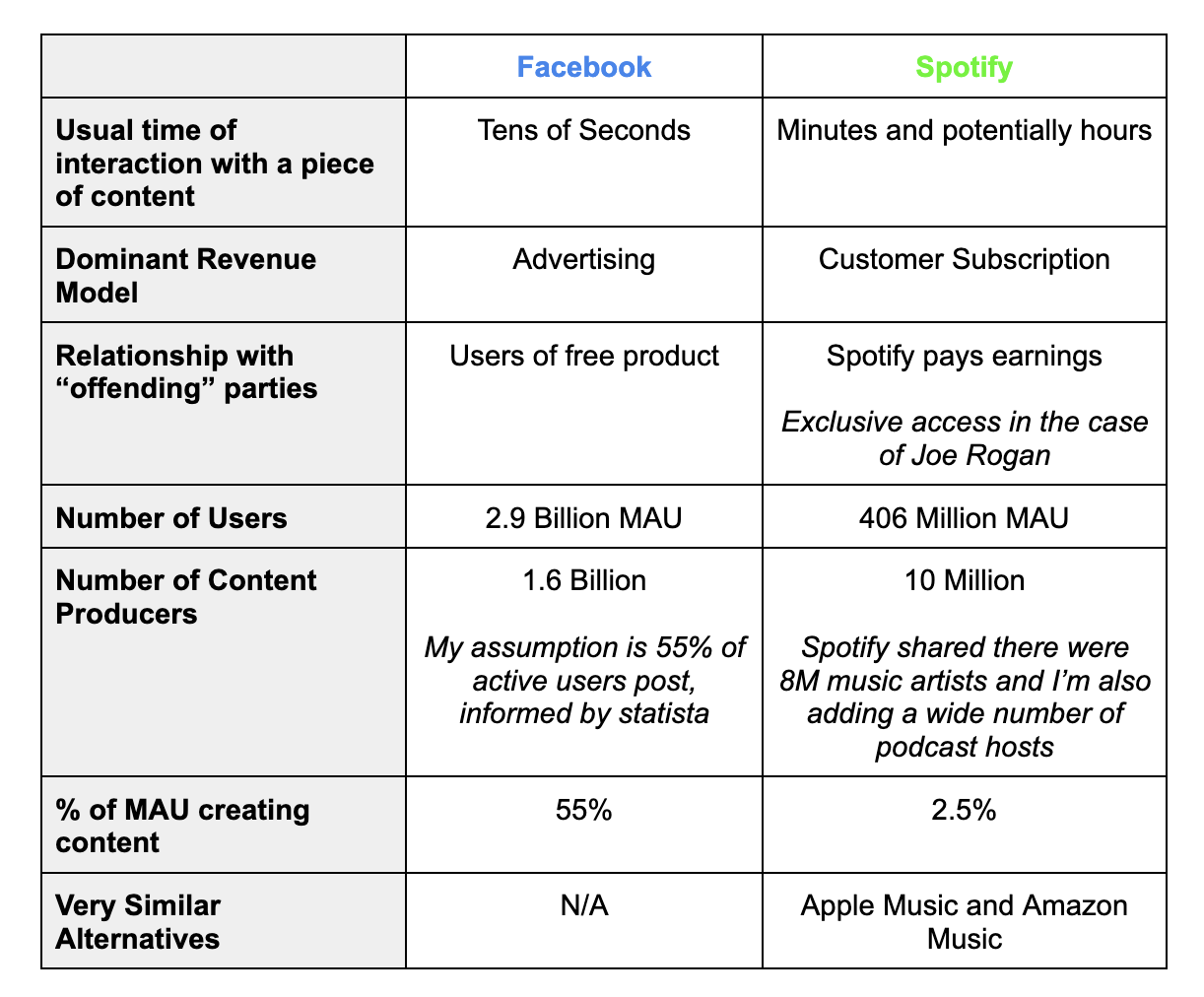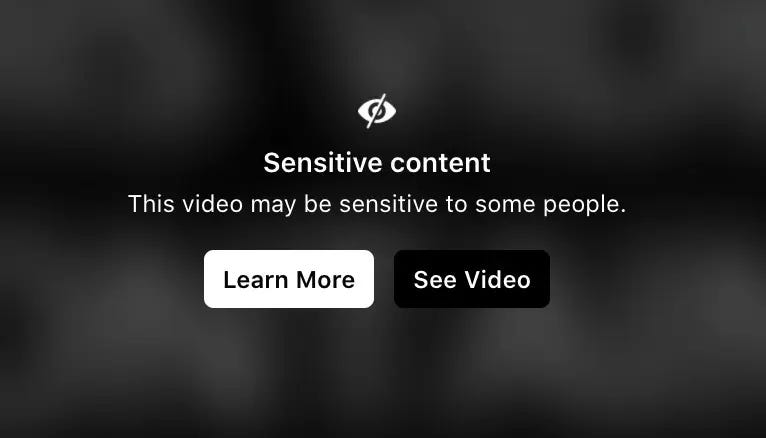I enjoyed writing the last edition and got positive feedback. Going to keep it up every other thursday for a bit. This edition I’m only digging into one development I found interesting: Joe Rogan and Spotify’s response to COVID-19 misinformation concerns.
Context: Neil Young and other artists pulled their music from Spotify. They did this after concerns from medical professionals that certain episodes from Joe Rogan were perpetuating false information about COVID vaccination went unanswered by Spotify.
Let me be clear, this represents my opinion and occasionally I may get things wrong. Stating this is upfront is important as we’re talking about sensitive topics. As you will see below, it could be good for episodes on Spotify to do this too.
There’s been a lot of coverage on this topic. I highly recommend first watching Rogan’s 10m Instagram video, reading Spotify’s response, and then commentary by Protocol and Bloomberg. Also, props to Neil Young, Joni Mitchell, and others for acting on their convictions.
I’m going to dig into two aspects:
Rogan’s apology video
How Spotify’s position is not the same as Facebook’s
Again, I recommend you watch Rogan’s video. I found it to be reasonably humble about areas of improvement, but also honest about what his show is supposed to be. He expects his listeners, all 11 million of them who listen for an average show length of 2.5 hours, to know that these are in-depth conversations with a variety of perspectives. Some guests are highly credentialed, some are super opinionated and possibly completely wrong, and some are both.
I’m not condoning a broad suggestion that says people shouldn’t get vaccinated. But I agree with Rogan’s commentary on the concept of ‘misinformation’. Information changes. Vaccines do lose efficacy. You can get infected even if vaccinated. This is much more probable than was believed in the spring of 2021. So the “facts” have changed. And this is totally normal in scientific pursuits. We used to think the sun revolved around the earth!
Platforms have to attempt to express that certain information is nuanced, subject to interpretation, and could be changing. And it would be great for the public to weigh what this information could represent - fact, opinion, or fiction. After all, the content that is causing so much anguish is hosted on the official podcast of a comedian.
This is tricky at the scale that these platforms operate and it will be imperfect. However, they must at least try. As Protocol noted, it would really help if there were clear legal rules for platforms to operate by that protected diverse speech while articulating the bounds for moderation and education.
Some content should be taken down outright and just not allowed, such as child porn. But for other things it might not be so black and white, which is why I’m on board with Spotify’s supposed product experience of a clear advisory (which is not actually implemented that clearly right now - see below). For example, Game of Thrones was watched by tens of millions of people even though it had some very severe, triggering content. But it was extremely clear that it was fiction via rating, labeling, and story. Spotify should have had these advisories earlier.
Spotify’s Response
Spotify’s response is lackluster. If you read the blog post, Spotify is trying to act like they are in the same position of Facebook. That’s just not true across a number of factors of the business.
Yes they both have a huge user base on digital products, are hosted internationally on the internet, and have some percentage of revenues from ads. But it kinda stops there. See below for a comparison table.
Some things that jump out from this table:
Spotify is largely paid by its users directly, unlike Facebook.
If you presume most Facebook MAU are also producing content and posting, Facebook has a much higher % of their userbase who are also content producers. This makes sense as Spotify’s producers are podcast hosts and musical artists whereas Facebook’s are more casual.
As noted elsewhere, Joe Rogan’s show is Spotify’s responsibility as they are paying him for exclusive access. Accordingly, they need to be clear on their responsibility too - even if it’s just saying they stand behind its diversity of opinions. I would classify issues with his show as product risk rather than just behavioral risk.
The time spent with a piece of content, and thereby the producer, on Spotify is much higher. Accordingly, more can be expected from both users and producers.
The switching cost from Spotify is lower than that of Facebook as network effects aren’t as strong. Facebook’s alternatives, such as TikTok and Instagram, are not nearly as similar in experience as Spotify’s alternatives are.
Spotify can ask much more of its content producers than Facebook can. First, there’s many fewer of them. Second, they are clearly more professional and have a vested, financial interest.
Producers on the Spotify platform should be required to properly label and categorize their content. It’s not an onerous ask - most of them already fill out show notes and song descriptions. It’s the same way developers on the App Store and movie producers are required to set suggested age limits. However, right now the two episodes of particular concern don’t even articulate that these are opinions and this is a talk show. Even weeks after the controversy, The Robert Malone episode still only has an emphasis on Dr. Malone’s background and it has an out-of-place-seeming banner to Spotify’s COVID help center.
Instead, the Robert Malone episode should have a treatment to the effect of “this episode may be controversial”. Alternatively it could have an ‘opinion’ tag, similar to the same way that music is labeled if it is explicit. Or, if Spotify wanted to be heavier handed right now, they could borrow from Facebook’s experiences and label that episode as ‘sensitive content’.
Joe Rogan’s headline page does a bit better saying it’s the official podcast of a comedian and has labels of ‘Comedy’, ‘Society’, and ‘Culture’. I hope this gives most of his listeners clarity that this represents discussions that seek a variety of opinions, not necessarily a single truth. But even that could be clearer, as Joe shared in his video.
Lastly, the platform policies that Spotify shares with its producers should be as clear as possible so producers know the rules to protect their art and their earnings. Publishing them is a good step forward, but examples would help a lot.
Spotify can do better. As Neil Young and others showed, those producers, and listeners, have alternatives.





